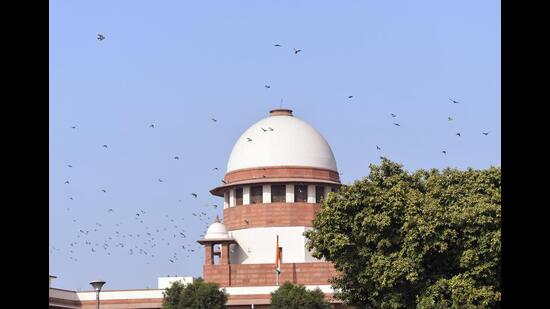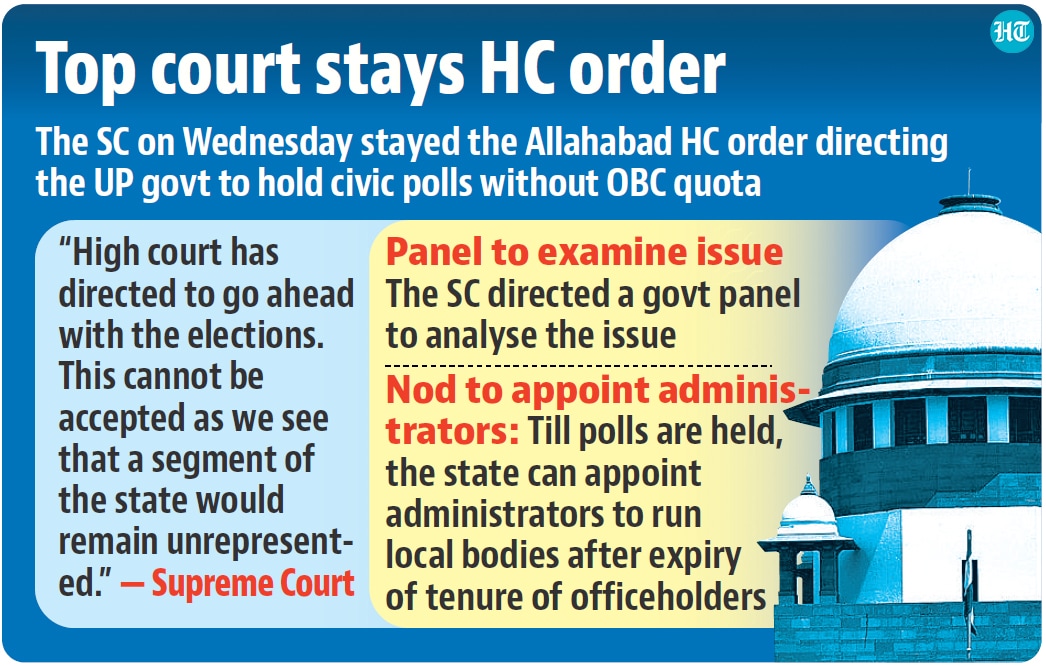SC stays Allahabad HC order to conduct local body polls without OBC quota
Uttar Pradesh chief minister Yogi Adityanath hailed the top court’s verdict.
The Supreme Court on Wednesday stayed an order of the Allahabad high court that allowed elections for chairpersons of state municipal bodies in Uttar Pradesh to be notified without any reservation for backward classes — a decision that comes as a relief for the UP government since the issue has become a political hot potato in the state.

Hearing separate appeals by the state government and UP state election commission against the December 27 verdict of the high court, a bench of Chief Justice of India (CJI) Dhananjaya Y Chandrachud and justice PS Narasimha said: “High court has directed to go ahead with the elections. This cannot be accepted as we see that a segment of the state would remain unrepresented.”
Uttar Pradesh chief minister Yogi Adityanath hailed the top court’s verdict.
“We welcome the Supreme Court order on urban local body polls in the state. The state government will assist in holding these polls within the stipulated time frame set by the Supreme Court,” the chief minister tweeted.
In Uttar Pradesh, backward groups were crucial to the Bharatiya Janata Party’s (BJP) phenomenal electoral performance in 2022, when it became the first party in three decades to return to power in the state, and the high court’s verdict had put the Adityanath government under pressure from opposition parties who were blaming the BJP for failing to protect political reservations for backward groups.

The high court, in its December order, set aside a government notification on quota for other backward classes (OBCs) in local body elections on the grounds that the state must follow a “triple test formula” laid down by a Constitution bench of the Supreme Court in 2010 before carrying out such an exercise. The triple test requires the state to set up a dedicated commission to conduct a rigorous empirical inquiry into the nature and implications of the backwardness of OBCs with respect to local bodies, specify the proportion of reservation in light of the commission’s proposals, and not exceed the 50% quota cap as held by the top court in a landmark 1992 judgment.
A day later, on December 28, UP constituted a five-member backward classes commission which said it would require six months to table its report. Solicitor general Tushar Mehta, appearing for state, told the Supreme Court on Wednesday that this period could be curtailed to three months.
“The SG submits that though the tenure of Commission is six months, an effort will be made to ensure that the process of completing this exercise is done expeditiously on or before March 31,” the court recorded in its order.
Posting the matter after three weeks, the bench asked the state to explore the possibility of asking the commission to give a preliminary report as it was conscious of the “constitutional vacuum” created due to the absence of elected bodies in municipalities for a period of three months.
Referring to Article 243-U of the Constitution which mandates duration of municipalities, the bench said, “Can there be a constitutional vacuum for three months. We are worried about Article 243-U. There will be a vacuum. Can the commission not prepare a preliminary report?”
Mehta sought to take instructions in this regard before the next date, and till the report is prepared, urged the court to continue the mechanism proposed by the high court which had directed a three-member committee to administer municipalities till fresh elections are held.
The bench accepted the suggestion and said, “For the purpose of ensuring the administrative work of the local bodies is not hampered, the government is at liberty to issue notification for delegation or discharge of financial power in consonance with direction (D) of the high court order.”
The high court, in its order, held that till the formation of the elected body, the day-to-day affairs of the municipal body shall be conducted by a committee headed by the district magistrate (DM) along with two other members including the chief executive officer or municipal commissioner and a district-level officer nominated by the DM. The top court further added a caveat that the committee must take no major policy decision.
The issue has arisen in other states as well in recent months. In Maharashtra, Madhya Pradesh, Bihar and Odisha — all three states tried to institute OBC quotas earlier this year but the judiciary struck down the government notifications for not adhering to the triple test. Madhya Pradesh and Bihar later set up a commission and its report was accepted by the court in part or full.
“This government should have set up the OBC commission long back if it was actually interested in settling the issue. We have also moved the Supreme Court on the OBC quota issue as we don’t trust this government,” said Samajwadi Party leader IP Singh.






